Psychology of Gambling

The Psychology of Gambling
© 2012 by Nenah Sylver, PhD
Introduction
The peace and beauty of New York state's Hudson Valley, where I used to live, was always in danger of dwindling fast. The rediscovery of the ancient, resplendent Catskill Mountains inspired more and more people to relocate to the region, hugely increasing the number of houses and stores, and bringing more traffic, pollution and noise.
But even an unprecedented onslaught of residents couldn't do a fraction of the damage that gambling casinos would cause. Seething, emotional debates were many and long about whether casinos should be allowed in the region. The companies that wanted to build the casinos of course claimed how many benefits they were providing, while residents argued that the casinos would hurt the area economically and ecologically.
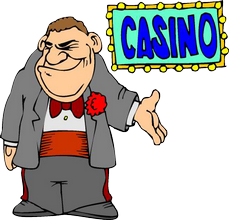
Since those furious debates of 2004, no new casinos have been built in or near the town in which I once lived. However, the multi-faceted damages that casinos can cause—as well as the principles behind gambling—remain the same. Ironically, when I moved from the Hudson Valley to the Phoenix, Arizona area in the mid-2000s, I was greeted by hundreds of casinos. In part, due to its sizeable Native population, which owns and manages the casinos, Arizona is a gambler's paradise.
There are many aspects of gambling. This essay points out the pitfalls of gambling, but in a different way than other articles you might have read. As the world's economic situation becomes more shaky, and people worldwide becoming more desperate, I think it's time that we delved into the deep-seated damage of gambling that includes many aspects: economic, environmental, psychological, and even spiritual.
Environmental Impact
Casinos create pragmatic problems. One valid concern is the environmental impact of more people using already scarce water resources, and the danger of groundwater pollution from increased sewage and pesticide runoff of additional lawns and golf courses.

Economic improvement is questionable: although the "pro" faction claims additional income will be brought to the area, these monies will stay in the casinos, since the gamblers—here for one thing only—are unlikely to venture outside and purchase goods from local merchants. Few well-paying local jobs will be created, since casinos import their own highly trained staff. According to a 2001 Managerial and Decision Economics study of other regions that opened their doors to gambling, each dollar of benefits associated with casinos nationwide extracts two dollars in costs to society, since casinos bring an increase of traffic jams and crime. Note that many games of chance—dice, roulette wheel, slot machines, cards—are geared towards people who play to "make a killing." In areas that allow gambling, is the higher-than-normal crime rate really an accident?
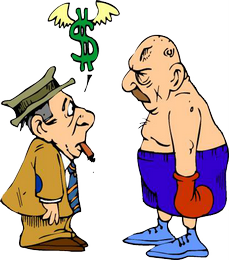
The Native Americans, on whose land the casinos would be built (because their special sovereign status exempts them from having to pay the usual taxes), are themselves divided. To some, casinos offer the easiest opportunity to raise themselves out of poverty. To others, gambling opposes the spiritual foundation of Native American traditions. It cannot be argued that Native Americans, historically subjugated and colonized by white Europeans, have a lot of economic catching up to do—and Native-run casinos do appear to offer some hope of financial salvation. But how many people would actually benefit from these casinos? And what about the psychological and spiritual costs?
Psychological Issues of Gambling -
They're More Profound Than You Think
Aside from the compelling economic and environmental data against casinos, consider the psychological fallout of gambling. Gambling is not simply another lifestyle, or mode of entertainment like movies or surfing. According to a 1999 report from the nine-member National Gambling Impact Study Commission, about five million people in the United States have a gambling problem, and an additional fifteen million are at risk of joining them.
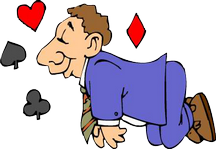
Someone whose repeated gambling creates problems is called a compulsive gambler. Casinos can't exist without compulsive gamblers, points out economics professor Earl Grinols of the University of Illinois. Although compulsive gamblers comprise only 4 percent of the adult population, they can create as much as 52 percent of a casino’s profits. The compulsion has a pattern: Even though the gambler knows that the odds against winning are astronomical, s/he gambles in vain, trying to fulfill unrealistic daydreams of acquiring more and better possessions and the admiration of more and better friends—and thus achieving greater social status. Desperate people, overwhelmed with financial hardship and emotional strife, risk losing their life savings, homes, and even friends and family due to gambling. The National Opinion Research Center recently reported that gambling correlates to statistically significant increases in divorce, domestic violence, child abuse, and suicide. Gambling has become such a common social and economic problem that Gamblers Anonymous (modeled after Alcoholics Anonymous) was created to provide support groups to help gamblers quit.
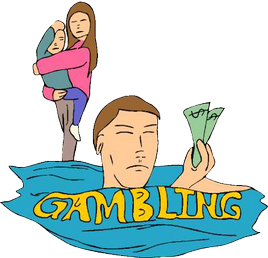
What induces people to gamble? "Nervousness, irritability, frustration, indecision and a continued breakdown in personal relationships," says Gamblers Anonymous. Compulsive gamblers are recognized as addicts by the health care profession as well as anti-gambling groups. For someone with an addictive personality, the first night at the craps table is compared to the first small drink of an alcoholic. Sooner or later, s/he is hooked on a destructive pattern.
Comparing alcoholism to compulsive gambling can be useful. But it’s important to precisely define addiction and examine how people become addicts. An addiction is a repeated unhealthy behavior that is a substitution or cover for feelings or a life situation with which the person cannot cope. Addictions are unhealthy because they create additional problems that can be as severe as those they were designed to mask. "I started smoking to relieve the stress of my marriage." "Drugs seemed like such an easy escape from my problems." "I began to overeat out of boredom." "The more people I get into bed and score with, the more control I feel I have over my life. It makes me feel powerful and desirable." "Making lots of money is the only way to earn respect," and so on.


Like those who are addicted to drugs, food, sex, money, prestige, or various forms of power-over others, people who compulsively gamble have serious issues in their lives that they aren’t facing. But addictive behavior never works because it doesn’t solve anything. Precisely because an addiction is a substitute for dealing with the real problem, the actual issue—be it loneliness or depression, or feeling unloved or useless or undeserving—is never addressed. It’s like putting a bandage over a sore so you don’t see it, rather than examining and cleaning the wound so it can finally heal. This is why the addict feels compelled to engage in the addictive behavior, over and over and over.
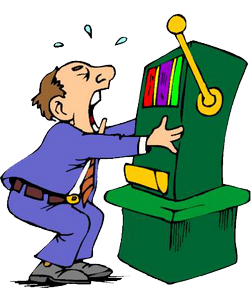
Gambling addicts have unbearably high levels of stress. Stress tolerance can be defined as the ability of a person to handle input from either external or internal sources without becoming depleted or losing the ability to efficiently function. If the person becomes less able to function, the input is too harsh. People have different ways of coping with stress and managing their emotions when, say, dealing with the breakup of a relationship or the loss of a job. One person might hike in the woods or meditate. Another might drink for a week or visit a casino. But while the former coping mechanisms are restorative, drinking and gambling are not. They usually make problems worse.
Given time and proper support, the addict may acknowledge that s/he has a deep-seated problem that brought on the addiction (gambling). But usually the gambler cannot admit to the addiction. If the original problems were so easy to deal with, there wouldn’t be a need for the substitute behavior in the first place! So one major component of being attracted to gambling (or any addiction) is the person’s decreased capacity for emotional honesty.
But is every gambler emotionally impaired? Let us assume that someone is visiting a casino for "fun" and presumably innocent excitement, rather than from the need to escape emotional problems. The psychological harm still exists: Think about why people like the excitement of gambling. Gambling is exciting because very few people can win. The more you risk, and the greater the odds against winning, the more exciting the game becomes.

The need for excitement in itself is not a bad thing. Humans are hard-wired to need stimulation, and some require more than others. But the excitement generated by gambling is built on a self-defeating principle: In order for there to be one winner there must be many, many losers. Winning feeds the (usually unconscious) fantasy that the winner is somehow better than the others. If s/he won, s/he must be luckier, smarter, braver, more skillful, somehow worth more than all those losers. After all, if everyone suddenly got lucky, smart, brave and skillful, the gambler would no longer be able to see herself or himself as special. And the game would lose its appeal.
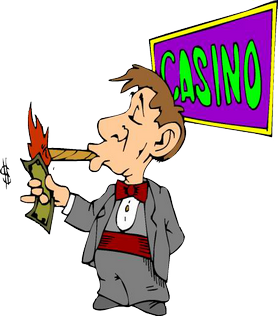
The heightened feeling of self-worth that the winner feels is (pardon the expression) a house of cards, an image without a foundation. This is because the idea that one’s intrinsic value is based on the devaluation of others is a contradiction in terms. True self-esteem comes from within. People with genuine self-esteem can accept and manage their emotions, embracing what makes them human. They are able to make choices that are consonant with their genuine needs. Secure enough to reveal themselves, they find joy in connecting to others and are not afraid of intimacy. People who lack self-esteem, on the other hand, have a sense of self that is derived from without because they depend on the approval or disapproval of others. The face they show to the world must be carefully maintained and regularly monitored. Such people are less able to accept and manage their emotions. Often they cannot plan for long-term goals. Fearful that others might see through their pretense, they have more problems being intimate in relationships.
Winning makes gamblers
finally feel good about themselves.
Yet how genuine or stable
can one’s self-esteem be
if it can be so easily
awarded and withdrawn
with a lucky toss of the dice?

Now let us assume that someone who is financially comfortable and psychologically secure is at the casino. (This means that neither their pocketbook nor self-esteem will suffer if they lose.) Will that person be harmed? Perhaps not immediately. But gambling is much more than an innocuous social gathering, a shallow glitzy extravaganza, or a challenge to show bravado when you’re losing your shirt. And gambling is more than a psychological whipping, and even more than a formula for financial disaster. Psychologically, socially and spiritually, gambling robs people of their humanity and compassion because it creates and perpetuates a hierarchical social structure based on inequality. Respectful relating disappears if what you win is obtained at someone else’s expense.

This is why someone on the "win" side of a "win/lose" paradigm is losing—though it might not seem obvious at the time. The win/lose paradigm of gambling keeps people trapped in a cycle of socially and legally sanctioned conquest.
"It is important…that the member see compulsive gambling in its true light, as an emotional illness," reads the website of Gam-Anon. While gambling is a personal problem, it is also part of a much larger social crisis. Gambling represents the very worst of American culture—a culture that emphasizes form over substance, materialism without conscience. This is evident when the pushy, ostentatious, greedy and discourteous are rewarded with fame and visibility (however fleeting)—and when those who make genuine contributions of empathy and service and honesty, are ignored. Gambling can only flourish under a system that promotes free enterprise at the cost of cooperation and mercy.
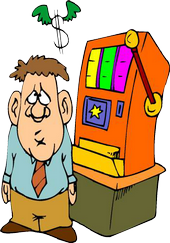
The gambling frenzy makes it easy to forget that we were all created by the same universal source, that what affects one affects us all. Until we all have the sustenance for a truly fulfilling life—love, respect, caring relationships, meaningful work, nourishing food, sound shelter, and ready access to an unpolluted natural world—casinos will exist. Casinos will prey upon people’s insecurities of not being good enough, their fears (real or perceived) of not having enough, their need to escape from pain, and—as long as they cannot handle life’s sometimes bitter challenges—their addiction to substitute excitement.
Is this the energy and mindset that we want in our communities? Are these principles consonant with Native American spiritual teachings—or with any other genuine spiritual teachings, for that matter? Is this the model of interacting that will truly enrich our lives?
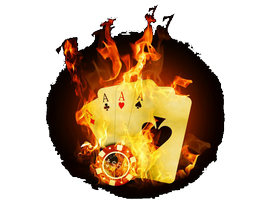
Resources
Gam-Anon International Service Office, Inc.
PO Box 157
Whitestone, NY 11357
phone: 718-352-1671
Gamblers Anonymous
International Service Office
PO Box 17173
Los Angeles, CA 90017
phone: 213-386-8789
National Coalition Against Legalized Gambling
100 Maryland Avenue NE, Room 311
Washington, DC 20002
phone: 800-664-2680
website: www.ncalg.org
http://www.gamblingfactsandfictions.com/

